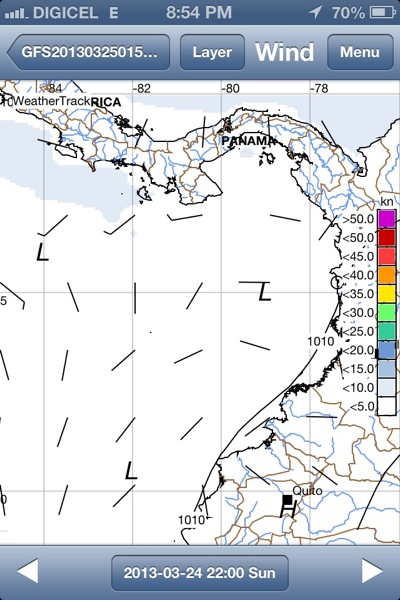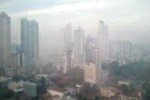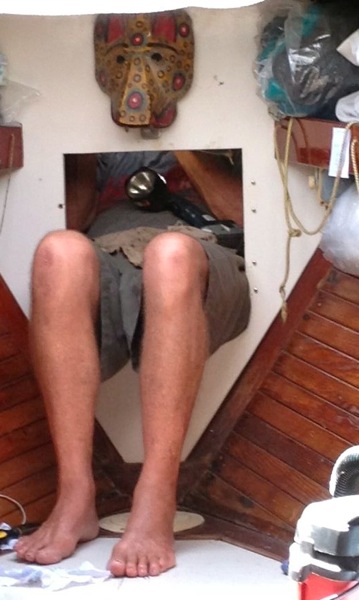You could say we got out of Panama City just in time but, actually, we got out a bit too late. There was a nice wind opportunity, another of those North American cold fronts with a long tail trailing over the Isthmus of Panama, enough to blow the palm fronds sideways. But we weren’t done with town stuff like chasing down parts and supplies until the last day of that weather, so only got as far as the Perlas islands.
Now, for the last fortnight, the GRIB files, computer renderings of predicted winds, show big blanks all along our route to Ecuador. What wind arrows there are lie featherless (less than two knots) and scattered every which-way. There are by now probably a couple dozen boats in the various Las Perlas anchorages hoping for that first breath of wind comes before they use up all their trans-Pacific groceries. There’s at least one Galapagos-bound boat (heard him on the radio) who has been happily drifting with the current for a week now, and reports sighting sea lions and sleeping whales.
We celebrated the first day of spring anchored south of the main island of Contadora. Although dreaming of daffodils and dogwoods, I made do with a faint haze of flowers on the few trees that aren’t deciduous and/or desiccated now at the end of the dry season. The Intertropical Convergence Zone shifts around us, making for interesting skies; they sometimes look watery but aren’t, yet. At times there has been even been mist and dew, enough to wipe out the horizon, and cover the deck, a free-fresh-water wipe down. At other times, the ITCZ is ‘indiscernible’.
After the serious work of getting the city grit off the boat, we took a dinghy cruise/fish troll over to the island of Mogo Mogo in search of a lime tree we’d heard about. Instead, we got waved off and whistled away by people shouting ‘Survivor Island, Survivor Island.’ It seems that a Russian edition of Survivor is being filmed right now. There’s a line of yellow caution tape strung along the shrubbery as far as the eye can see, and some structures around on the south side beach. Someone really desperate could probably flag a passing fisherman or even one of the yachts anchored at Chapera.
We also took a walk around Contadora, and found a lovely beach on the east end with a beached ferry boat and a semi-derelict resort.
Not sure about the ferry, but the resort developer reportedly died, and his wife was apparently unable to pull together all the building liens and financing to complete the project. Someone is working on part of it now though, and it looks like the Survivor people have a little ‘studio’ round back.
We’ve been calling Panama City the Big Smoke because it’s a charming phrase we once read in a Pidgin language dictionary, referring to cities in general. But these days in Panama it’s not really a joke. We had been getting bits of ash landing on the boat from hillsides being burned. In fact, Panama City lost its electric power a couple weeks ago when farmers lit a cane field that happened to be right under one of the country’s three main transmission pylons.
This time though, the smoke wafting through the anchorage smelled like man-made substances burning. Turned out it was the always busy Allbrook Mall, the largest mall in the country, which serves as the main bus terminal for provincial buses besides. The Madison/Conway store was badly damaged, and 60 neighboring stores were closed for smoke damage. Either there are no sprinklers installed in the mail, or they did not work. But no injuries or deaths were reported.
A day or two later the Diablo Rojo (Red Devil) buses were, as scheduled, taken off the road, leaving the entire city, as planned, reliant on the fancy new Metro buses. It’s part of Panama’s design to become a player in the World-Class City tournament. The Diablo Rojos are recycled US school buses, often exuberantly painted. You can fit three people in the seats on the left, two on the right, which makes maybe seventy sitting down and maybe not that many, but lots, standing up. Watching them unload is sometimes like watching the clowns piling out of the VW at the circus – how many more can there be?The fare is 25 cents, and the buses are usually full especially during rush hour. But they are old, uncomfortable, often poorly maintained, and considered to be dangerous.
The nice shiny new Metrobuses carry about 35 sitting, and I think I’ve read 60 standing. You need a preloaded magnetic card to pay; the fare except on certain express routes is still 25 cents. I’ve read that 300 Metro buses replaced 700 Diablo Rojos, but some of the coverage degenerates into remarks about corruption and cronyism so it’s hard to say what’s really going on. The construction of the subway which has so many roads torn up or closed down is another headache and it is rumored that the subway opening has been postponed from October until next February. Panamanians are generally patient people, habituated to spending hours in lines, even for the simplest store checkout, but they want to get home at the end of the day! After a week, the transit people urged patience and announced plans to put signs indicating where the various buses were headed in heavily traveled zones like Cinco de Maio. Plus there’s a another fire now, this time at a large landfill, wafting toxic fumes over the city, closing schools and sending folks to the hospital. Friends in the anchorage report that half the skyline is obliterated at times. They have some kind of foam fire stopper coming in from the US and also are using explosives to tame the flames. I read it online! Photo courtesy of newsroompanama.com
Plus there’s a another fire now, this time at a large landfill, wafting toxic fumes over the city, closing schools and sending folks to the hospital. Friends in the anchorage report that half the skyline is obliterated at times. They have some kind of foam fire stopper coming in from the US and also are using explosives to tame the flames. I read it online! Photo courtesy of newsroompanama.com
Googling around, I also found that none of these stories are new – big fire at the Mall back in 2009, riot police have been called in the past for bus problems, and the trash fires are a recurring phenomenon. The economy may be booming here with GDP running near ten percent, and of course the estimated five billion dollars being spent on the new Panama Canal locks and associated upgrades. Still, it seems there’s a lot of catching up to do before Panama can claim world-class status, or achieve half of what their role model, Singapore, has managed.
In our smaller world, now relocated in the clean clear air of the Perlas islands, the boat projects continue. I ‘m aware that a lot of these maintenance issues we’ve foisted upon ourselves by not leading simpler lives, but so far the balance is still in favor of the amenities! We’re getting really experienced at taking the water maker out as we chase down a pesky leak on the high pressure side. Some new engine parts arrived and have been applied with, so far, good results.
.
Lubricating the anchor windlass is not one of Doug’s favorite chores.
Getting city-fertilized growth off the bottom and the propellor is more pleasant now that the water has warmed some. Big splurge on a new aluminum-bottomed dingy (more appropriate for dragging across beaches in this land of double-digit tides,) but it needed an intricate fitted cover (‘chaps’), the making of which ate almost a week of my life. Software and computer issues spring eternal. Pressure canning ‘Meals Ready to Eat’ like beef stew, chicken soup, pre-cooked beans, and what may be a lifetime supply of kimchi.
Plus my brother Curt came and we got to be tourists and entertain the locals for a little while. Here Curt makes his own raspado ice drink.
And we really enjoyed our visit to the Panama Canal Museum at the Miraflores Locks, especially the simulation from the bridge of a ship passing thru. I can’t upload that video, so here instead is the bulk carrier Rosalia D’Amato, presently enroute from California to Tianjin Xingang, at an average speed of 12.2 knots, according to marine traffic.com. I wish I knew how to find out what Bulk they’re carrying.
So here we are, waiting for that light northerly wind predicted for the end of the week. Surely there’s one more northerly weather system left in the season! Then we’ll be moving towards Puerto Amistad, Bahia de Caraquez, Ecuador, 35 miles south of the equator, at an average speed of – well, we would hope for 5 or 6 knots, and the chance to travel there in a straight line, but neither is guaranteed, or maybe even probable.
In the meantime, there are nice rocks on the beaches, which I photograph instead of taking them home like I used to do!
And we’re catching some fish which I photograph, then eat.
That’s the report from Panama on the cusp of the season. The Pacific is living up to its name.